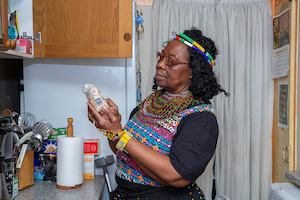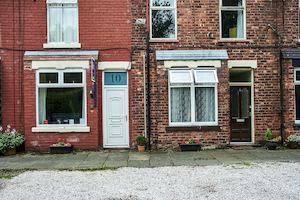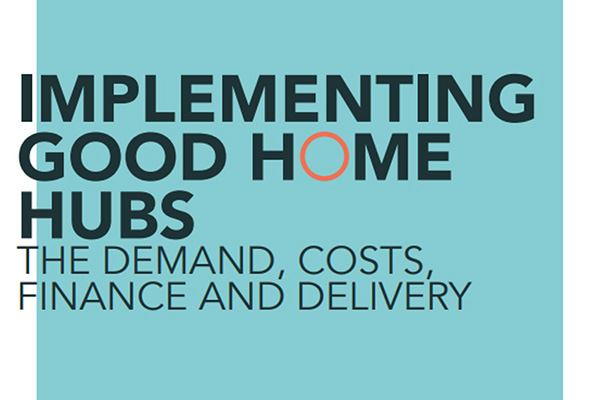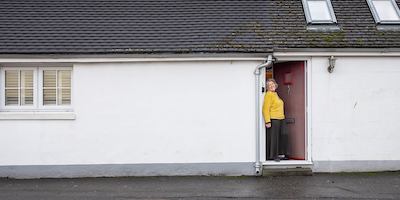Network of one-stop shops for home improvement would not cost government a penny to end tragedy of poor-quality homes

The country is in the midst of a poor quality housing crisis and lacks effective solutions to tackle it.
New research from Ageing Better and partners identifies a cost-effective solution that could change the lives of up to one million people a year.
Creating a network of one-stop shops for home improvement across the country would effectively cost the government nothing while delivering substantial benefits towards Labour’s growth and health missions, new analysis from Ageing Better and cross party think-tank Demos reveals.
A national network of Good Home Hubs assisting people with home improvements could pay for itself and actually deliver an annual net gain to the government of £16 million, new research reveals.
The research also highlights the stark need for comprehensive home improvement hubs with two in five UK households (11.6 million households) prioritising home improvements but facing barriers to delivering them. This includes one in eight UK households (3.5 million households) with a high need, enduring a daily inconvenience because of improvements not carried out on their homes.
A national network of Good Home Hubs would create local one-stop shops that provide support on all aspects of home improvement including energy efficiency and retrofit upgrades, accessibility changes, minor adaptations and handyperson repairs.
Although many local authorities do offer this service already, Centre for Ageing Better research found the range of services on offer varies significantly and leaves residents at the mercy of a postcode lottery.
The new analysis also details how a comprehensive home improvement service across the country would:
- Help health services by reducing hospital admissions and delayed discharges
- Raise health outcomes
- Help tackle fuel poverty
- Support vulnerable populations
- Boost the economy by creating jobs and supporting local businesses
- Develop a pipeline of skilled workers
- Lower household carbon emissions and extend the lifespan of homes
The new analysis estimates that a comprehensive Good Home Hub service would cost a local authority around £1.6 million on average – a figure similar to the savings proposed by some councils for moving to a monthly refuse bin collection service.
We're calling on the UK government to develop a national strategy to fix cold and dangerous homes which sets out detailed plans to improve poor-quality homes across all tenures and brings together work on housing currently divided between different government departments, such as health and social care and net zero.
The charity wants the government to back up the strategy with sufficient, long-term funding and help ensure home improvement support can be delivered at a local level through Good Home Hubs.
Dr Carole Easton OBE, Chief Executive at the Centre for Ageing Better, said:
"The quality of our homes is such a significant factor in the quality of our later life. It is a national scandal that millions of people, including a disproportionately high number of older people, are becoming sick because of their damp, cold, hazardous homes and thousands are dying. Much of this could be resolved with adequately funded, comprehensive support for people to maintain, repair and adapt their homes across the country.
“Creating a network of home improvement support would transform millions of lives while also delivering substantial national and societal benefits including improved public health, reduced strain on health and social care services, economic growth, and significant progress on climate goals.
“We need action from local and national policymakers to prioritise poor quality housing as the public health crisis it is and deliver the right solutions to ensure that everyone has a home worthy of the name that is safe, secure, warm and comfortable.”
Better homes, better lives: The role of home improvement services in boosting the nation’s health and wellbeing
Read our new housing reportDan Goss, Senior Researcher at Demos, said:
“The government's housebuilding plans are promising, but overlook the millions of dangerous, cold, and inadequate homes currently in Britain. If we want good homes for all, we also need to fix what we’ve got.
“While the elephant in the room is often money, that's not the case here. Good Home Hubs would empower residents to fix problems in their home, and the model would pay for itself. The hubs would cut costs for councils while expanding the market for home improvements, unlocking extra revenue.
“The reward for residents, the public purse and the country is clear. What’s needed now is action.”
To support the Centre for Ageing Better’s proposed model for a network of Good Home Hubs to tackle the nation’s poor-quality housing crisis, the charity has commissioned two new reports.
The Better Homes, Better Lives: The role of home improvement services in boosting the nation's health and wellbeing report, delivered by a consortium of experts led by the Centre for Regional Economic and Social Research (CRESR) at Sheffield Hallam University, assessed existing home improvement services across the country.
The report found that home improvement services deliver significant cost savings to the NHS and society including:
- The average cost of adaptations to prevent falls in the home is £1,600 compared against the cost savings of a prevented fall being £7,050 to the NHS and £29,140 to society.
- The estimated cost saving to the NHS from an early hospital discharge due to support from home improvement services is £2,690 per hospital discharge by cutting the average number of bed days by 40% from 15 to nine.
- Addressing excess cold in homes that are fuel poor and at risk of harm from excess cold delivers a return on investment of £10.12 in societal benefits for every £1 spent.
The analysis details how residents benefitting from home improvement services reported significant benefits including enhanced independence, improved safety and better mental wellbeing – with even small adaptations restoring residents’ confidence and reducing anxiety.
The ‘one-stop-shop’ model of home improved services was also praised for ease to access and the range of services available by service users.
Despite these benefits, the current home improvement landscape is a postcode lottery. Of the home improvement services surveyed by the Centre of Ageing Better evaluation:
- Fewer than three in four (69%) provided hospital discharge support
- Only three in five (62%) provided cold home or energy efficiency initiatives
- Half (54%) provided a handyperson service
- Around two in five (38%) provided home improvement information and advice
- And fewer than one in three (31%) provided loans to low-income homeowners
A second report Implementing Good Home Hubs: The demand, costs, finance and delivery by the cross-party think tank Demos assessed how Good Home Hubs could be implemented nationwide by exploring likely demand, costs and how the network could be financed.
Demos’s new analysis suggests that, if delivered across the UK, Good Home Hubs would support 390,000 to 550,000 households each year to fix their homes.
The report details how Good Home Hubs would deliver significant savings for councils across their current home improvement services, while also unlocking revenue from residents who are happy to pay to improve their homes but currently feel unable to do so.
The research asserts that creating a national network of local Good Home Hubs would help the government towards meeting its growth, clean energy and NHS missions as well as supporting their house building strategy and adult social care reform.
The report details a range of barriers and issues that prevent people from making the improvements their homes need which could be overcome by a comprehensive Good Home Hub service including difficulties finding trusted information, advice and support, access to finance and trusted tradespeople and lack of perceived ‘pay off’ for investing in their homes.
Millie Brown, Senior Evidence Manager for Homes at the Centre for Ageing Better, said:
“Home improvement services are vital to improving homes for millions of people. However, the availability of services across the country varies significantly, leaving many without the support they need to repair their unsafe homes.
“There are exemplary local services out there already but now is the time to end the postcode lottery which denies this level of support to all. And even with the very best home improvements services, limited funding, rising material costs and workforce shortages means growing demand is not being met. We need a sustainable and long-term solution to ending the poor quality housing crisis.
“The evidence from our research provides a clear roadmap for action, offering practical solutions that can transform lives while delivering significant economic and environmental benefits. By acting now, we can ensure that safe, suitable, and energy-efficient homes are not a privilege but a basic right for all.”
Janet Gilbertson, Senior Research Fellow in the Centre for Regional Economic and Social Research (CSESR) at Sheffield Hallam University, said:
“Our findings demonstrate the difference comprehensive home improvement services can make to people’s lives and the important role they can play in prevention. Home improvement services directly support health and social care services in numerous ways, for example, by enabling people to live more independently at home for longer, facilitating hospital discharge, and enhancing health and wellbeing.
“Some home improvement services have also developed their service offer providing support for energy efficiency, fuel poverty, and hoarding, all of which bring many health benefits. Our economic analysis provides illustrations of value from home improvement services. This included wellbeing benefits from adaptations, and cost savings from falls prevention adaptations, hospital discharge schemes, and interventions to prevent excess cold.”
In addition to a financially sustainable national strategy to improve housing quality, Ageing Better is also calling for:
- Housing quality to be treated as a key determinant of health as part of the NHS’s long-term planning.
- Dedicated funding for proactive housing interventions, including retrofitting homes and preventing hazards such as falls.
- Housing to be made a statutory component of Integrated Care Systems, ensuring that local health, housing, and social care teams work toward shared goals.
- Grants and financial assistance for vulnerable households to be expanded and streamlined to reduce barriers to critical home adaptations.










